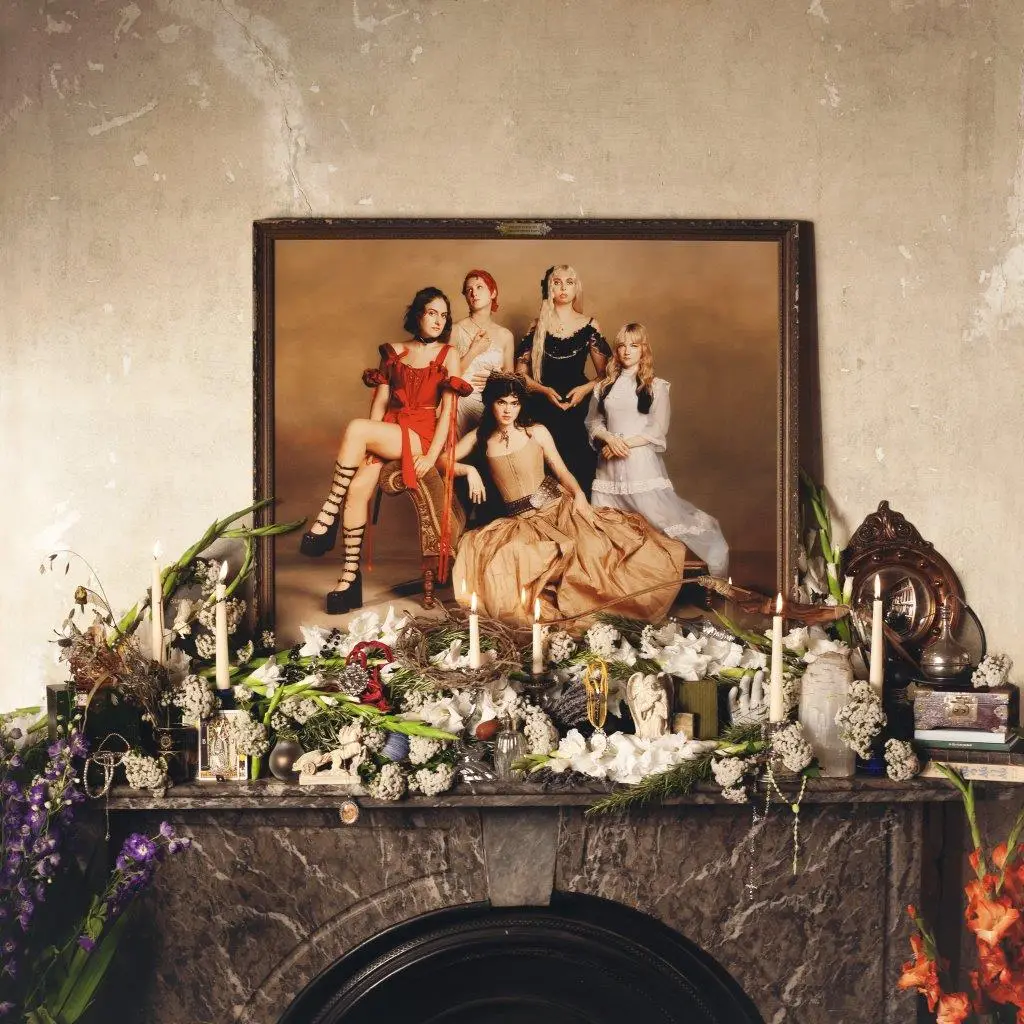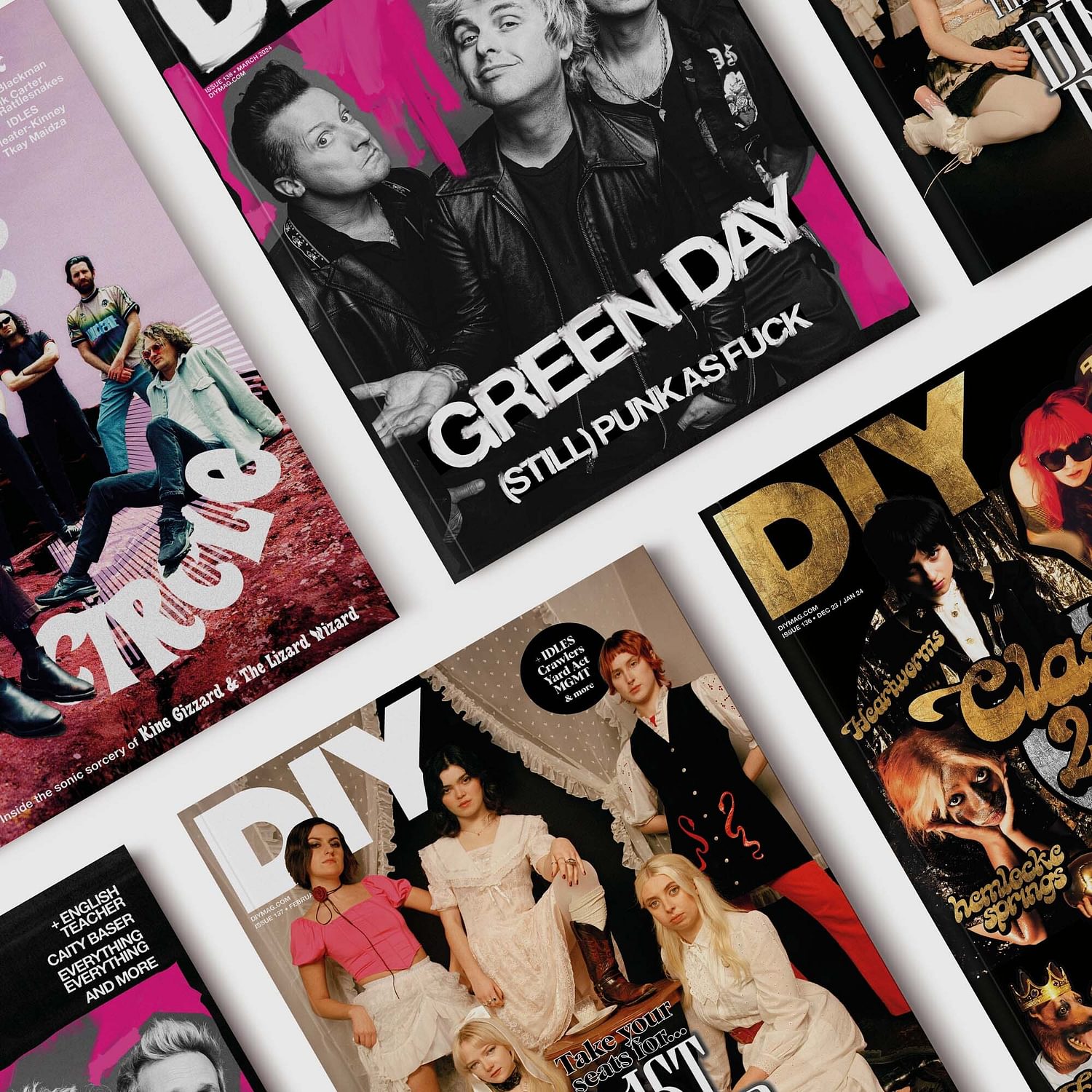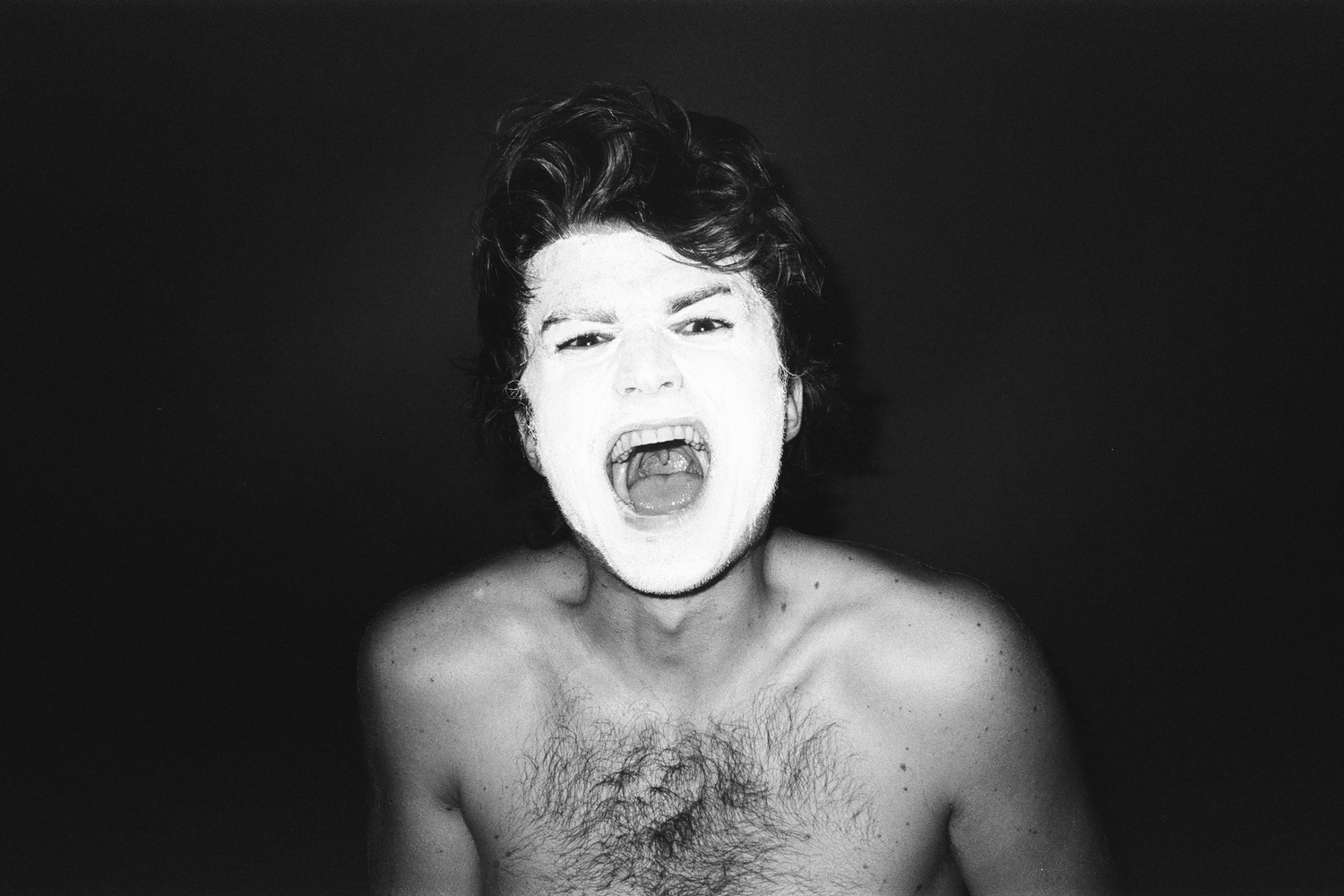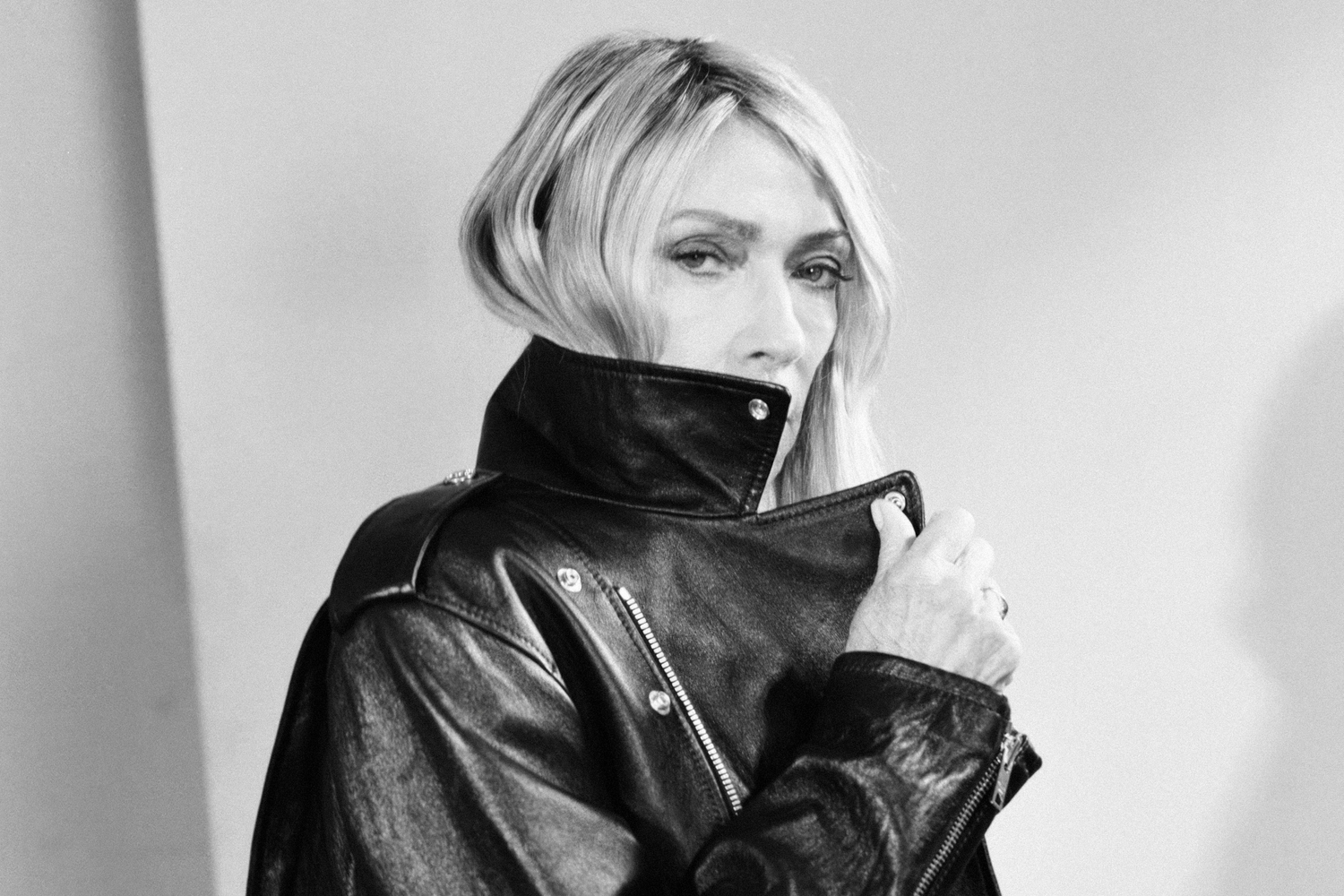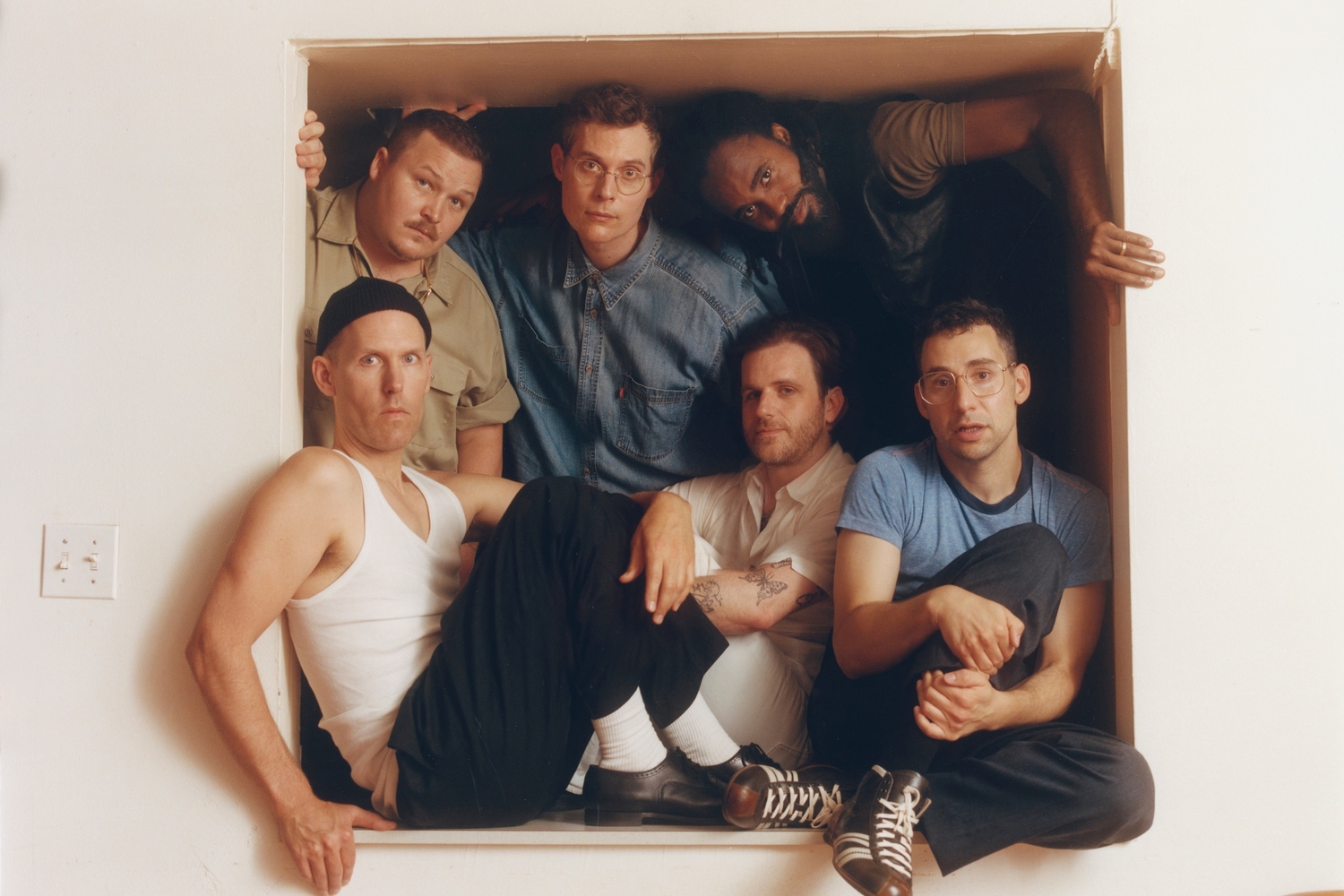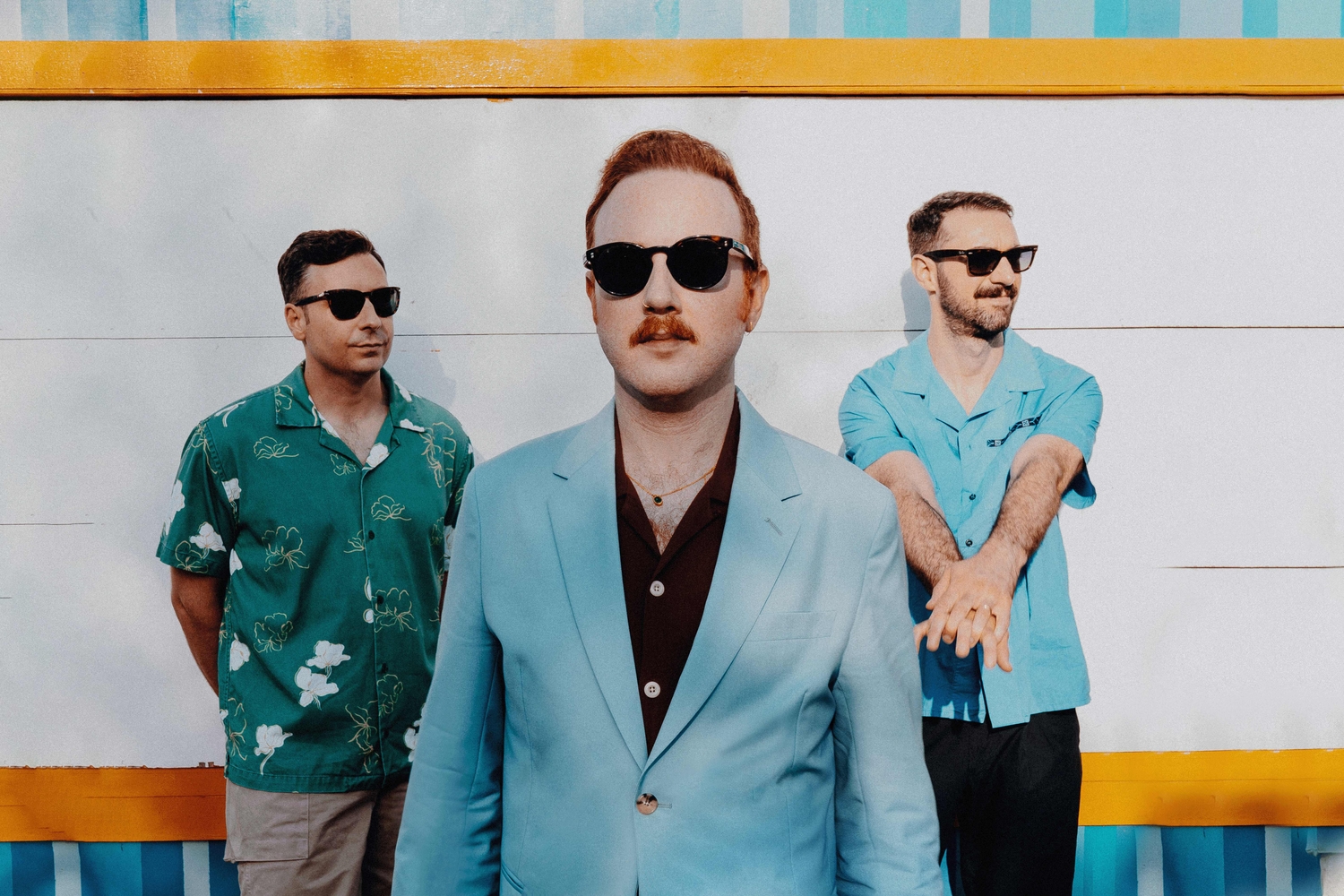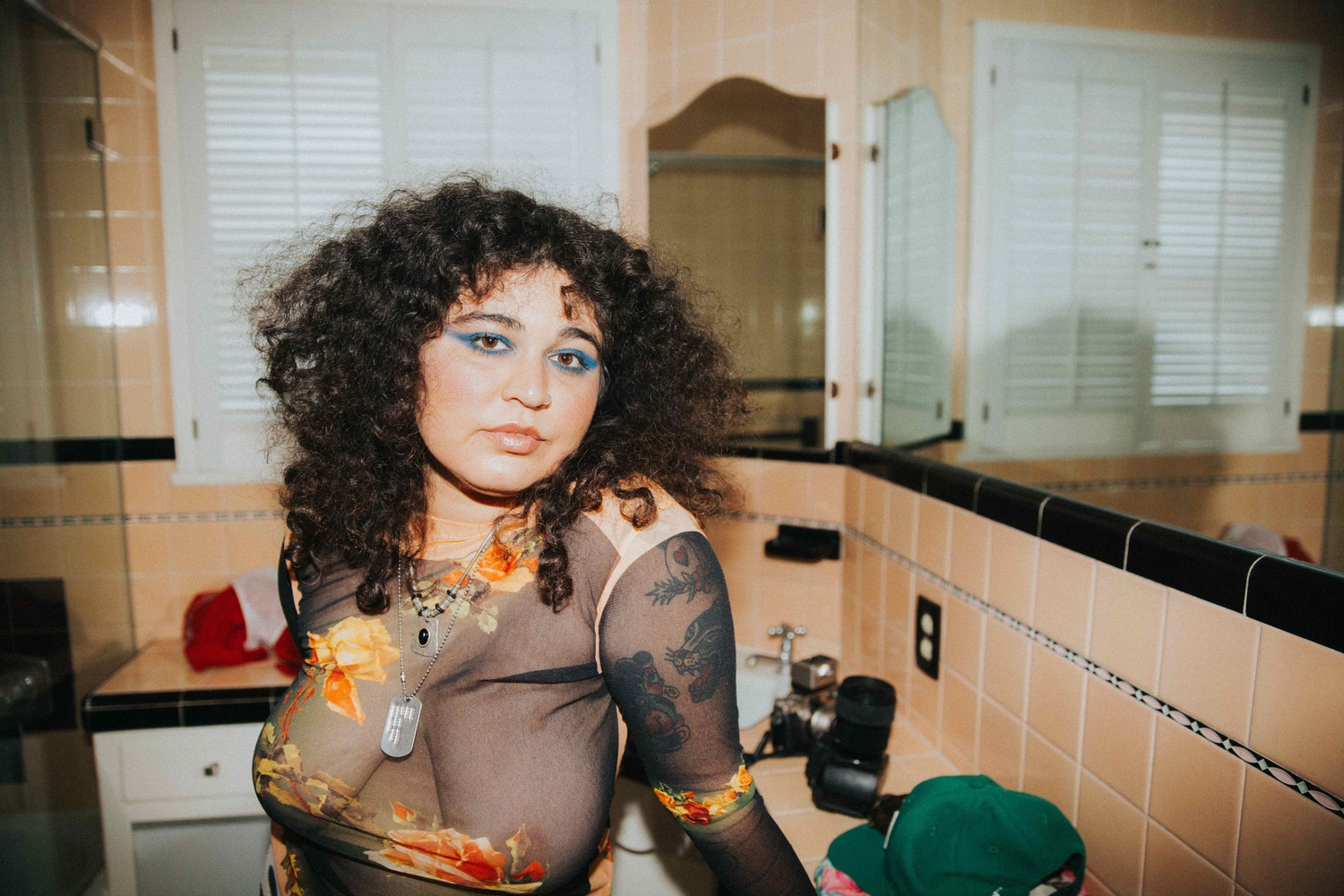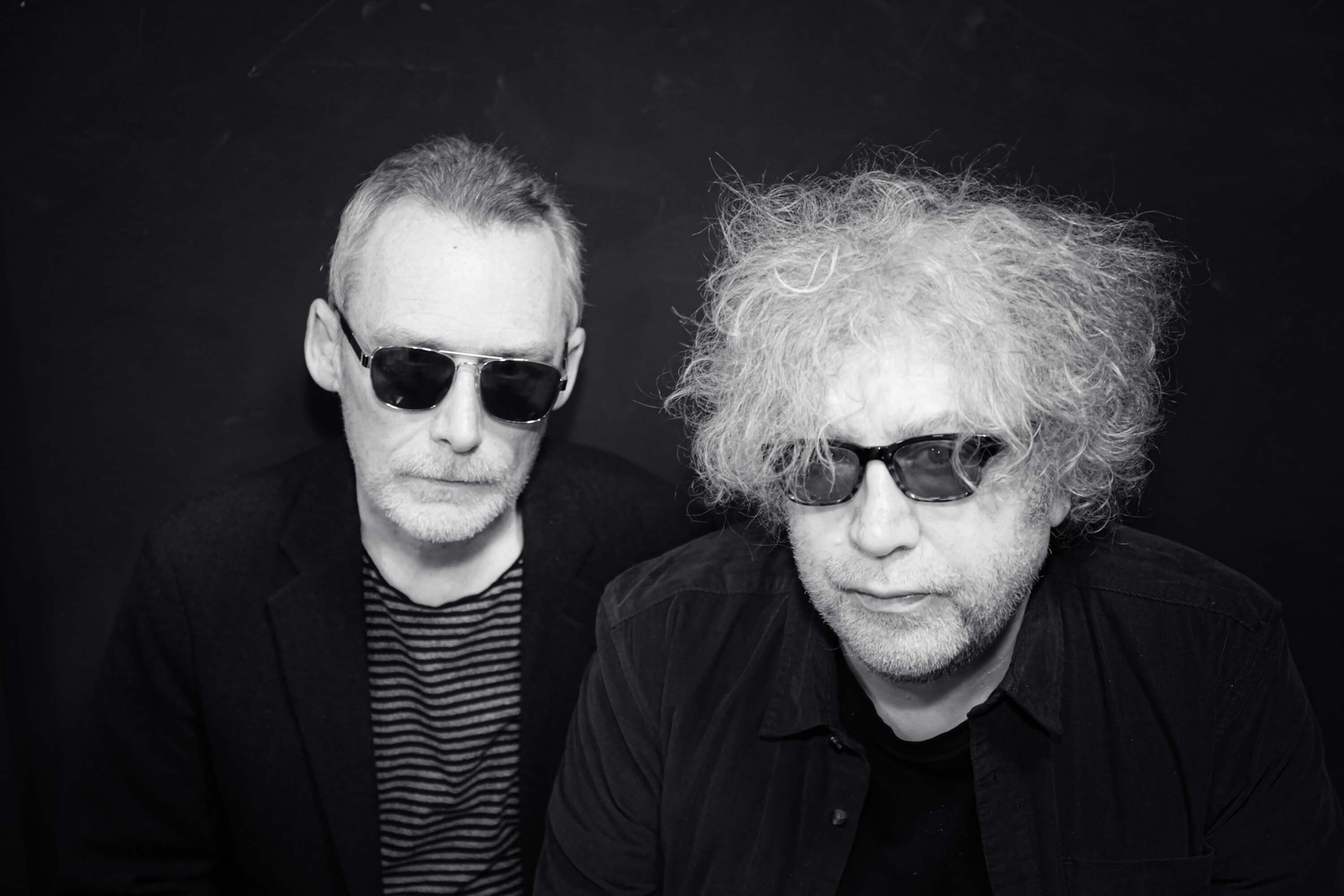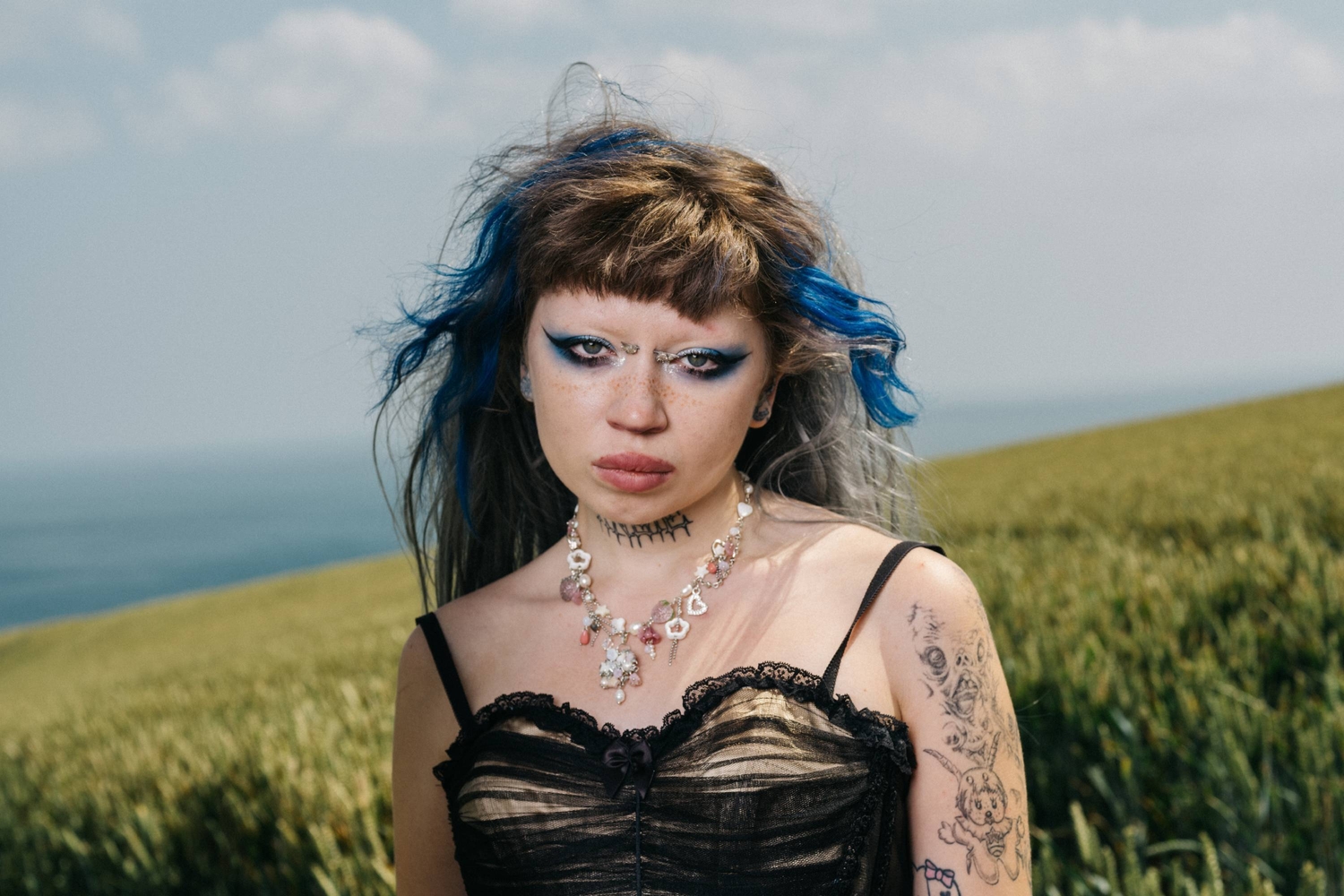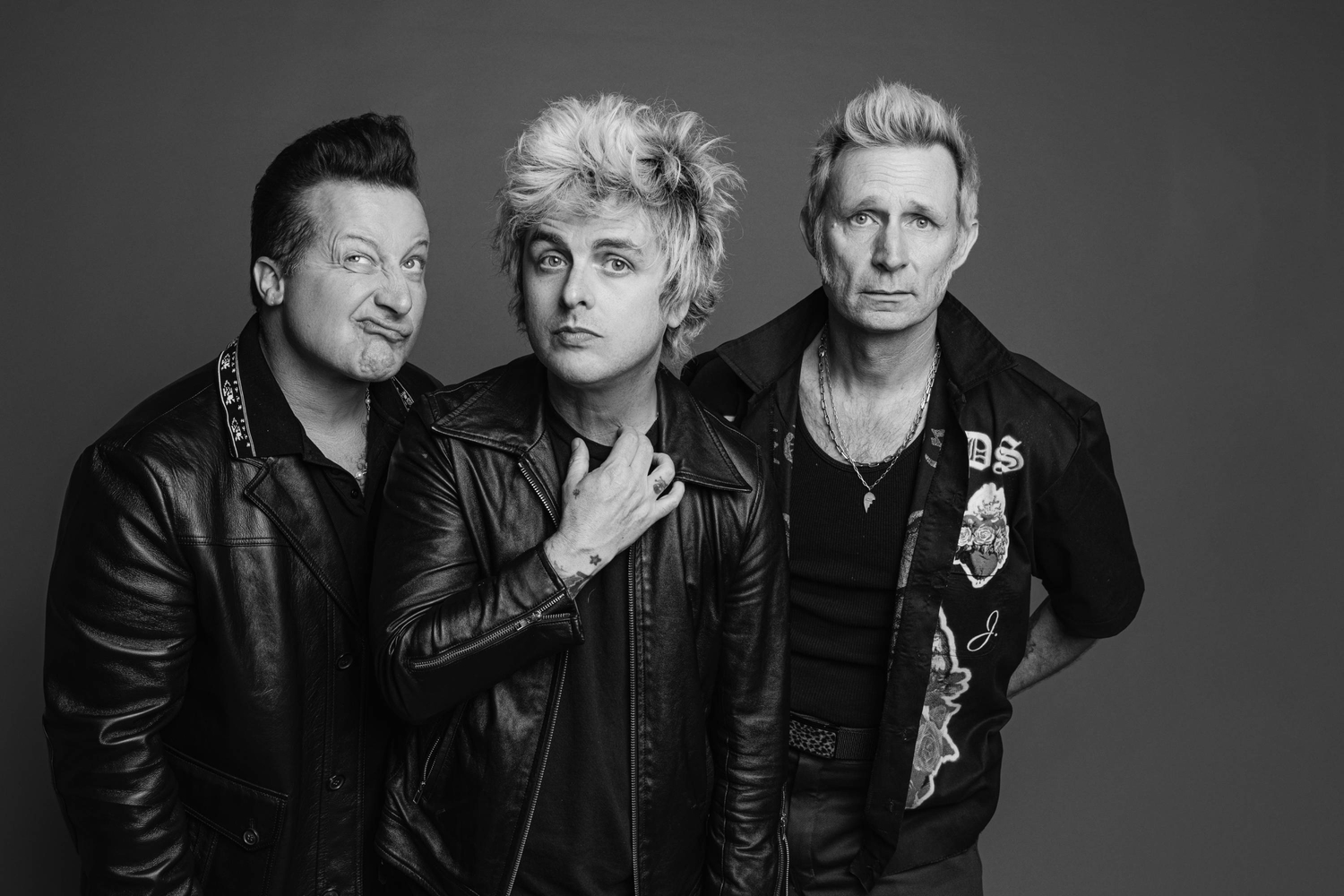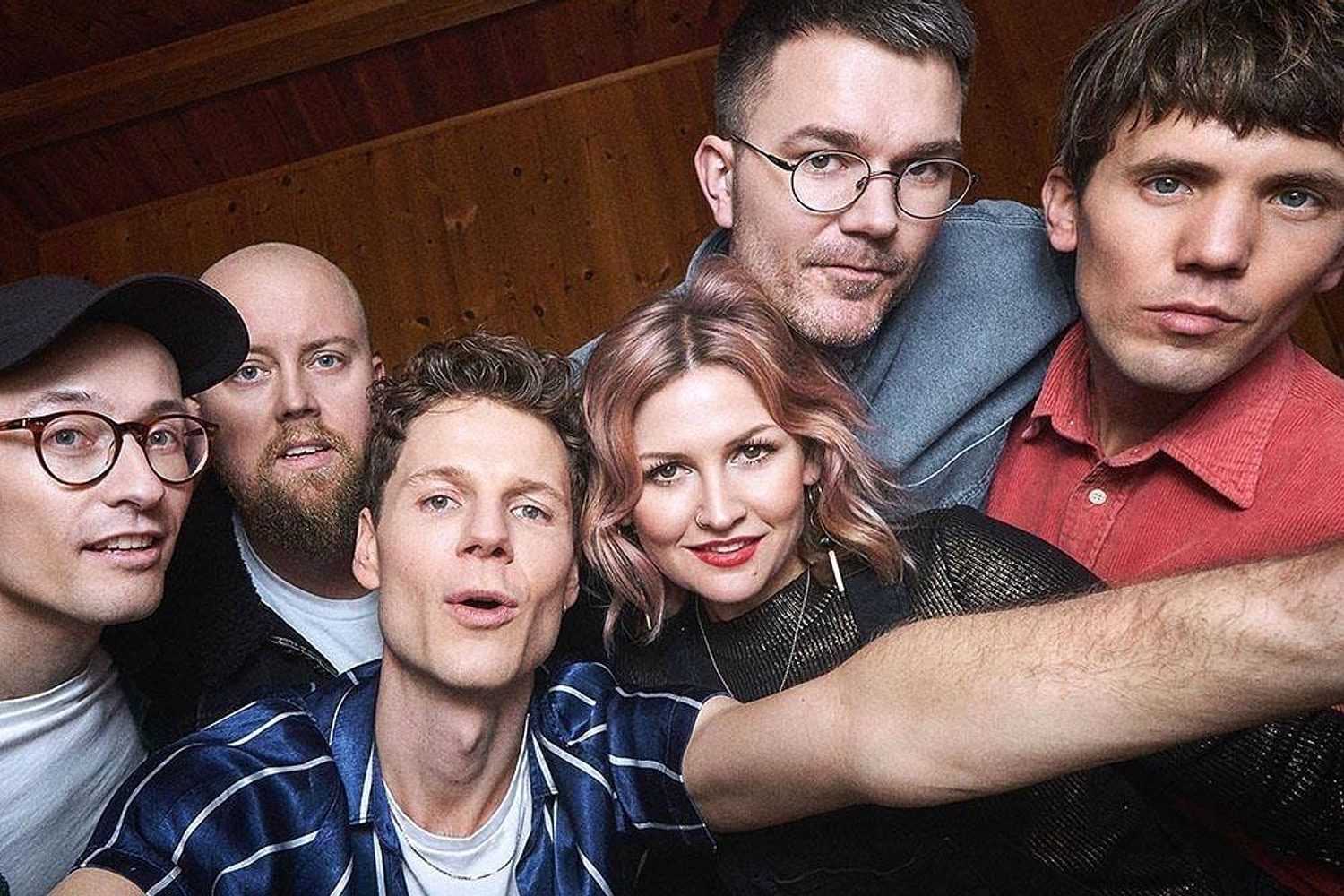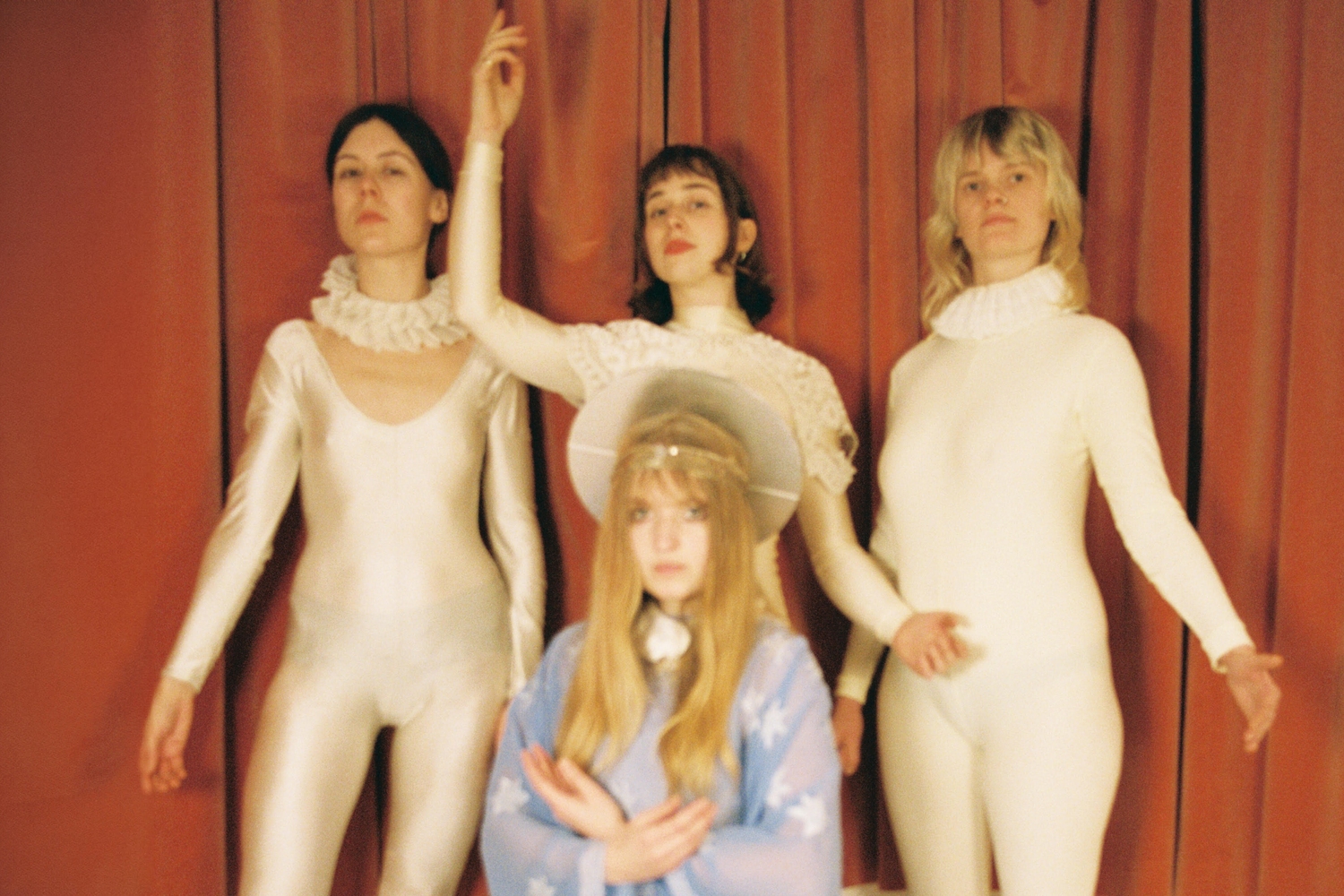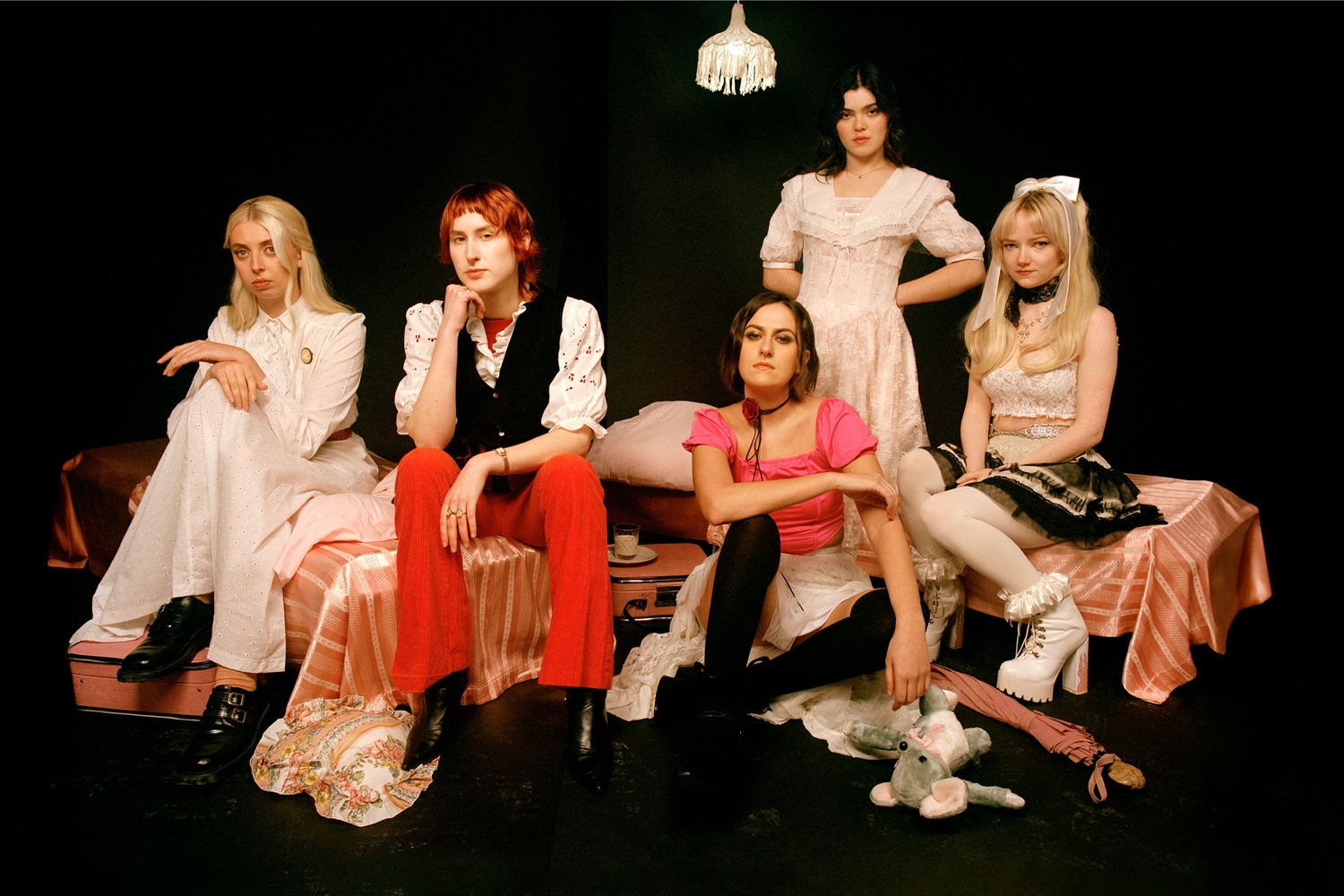
Cover Feature A Feast For The Senses: The Last Dinner Party
Having cut their teeth as the capital’s worst kept word-of-mouth secret, The Last Dinner Party provided one of last year’s defining musical moments when they unveiled the gauntlet-dropping rock opera of ‘Nothing Matters’. Now, with the arrival of their debut album, they’re proving that, in 2024, maximalism reigns supreme.
Tolstoy was a teenage girl,” grins Georgia Davies. “I swear, he was going through puberty. The way he writes young women in War and Peace and Anna Karenina; the way he writes their motivations and thought processes - it’s so impossible.” “Who told him?” her bandmate Abigail Morris exclaims, incredulous. “Who told him how ribbons make me feel?! He’s more relatable than Jane Austen, honestly.”
They may be perhaps THE most talked about new act in the UK, but The Last Dinner Party remain fundamentally unchanged: it’s been just over two years since their debut gig at East London’s George Tavern, and the five-piece are still, in essence, a group of literature-loving arts students with a penchant for joyous, positive pretension. “I wish Tolstoy had a podcast,” Abigail laughs. “I can imagine him and Dostoevsky doing a Trisha Paytas Frenemies sort of thing.” All three band members present - lead vocalist Abigail, bassist Georgia, and vocalist / rhythm guitarist Lizzie Mayland - burst into laughter, before near-simultaneously suggesting that they should do a skit of that very scenario.
Few people would immediately draw parallels between 19th century Russian auteurs and 21st century YouTubers, but such is the nature of The Last Dinner Party. Marrying high culture with camp, substance with style, they’re bricolage curators of a truly eclectic audiovisual exhibition. “We’re just magpie-like, forever collecting ideas and visual identities,” Lizzie affirms, discussing how five individuals go about executing such a rich yet cohesive creative vision. Abigail agrees, noting that there’s no sole ringleader to proceedings - rather, that the band are just “naturally hive-minded”. They’ve been compared to the likes of Queen, Bowie, ABBA, Kate Bush and Siouxsie Sioux, but being mentioned in the same breath as such hallowed names has, if anything, only enhanced the sense of theatricality brought to proceedings.
Their latest video - for ‘Caesar On A TV Screen’, which lands the morning of today’s chat - is am dram at its very best, complete with fake daggers and a death scene that recalls the rival school’s production in that modern Christmas classic, Nativity!. “That wasn’t a conscious choice,” laughs Abigail at the mention of the latter. “But someone did comment that! We are that school, basically - the ones who are just trying really hard.”
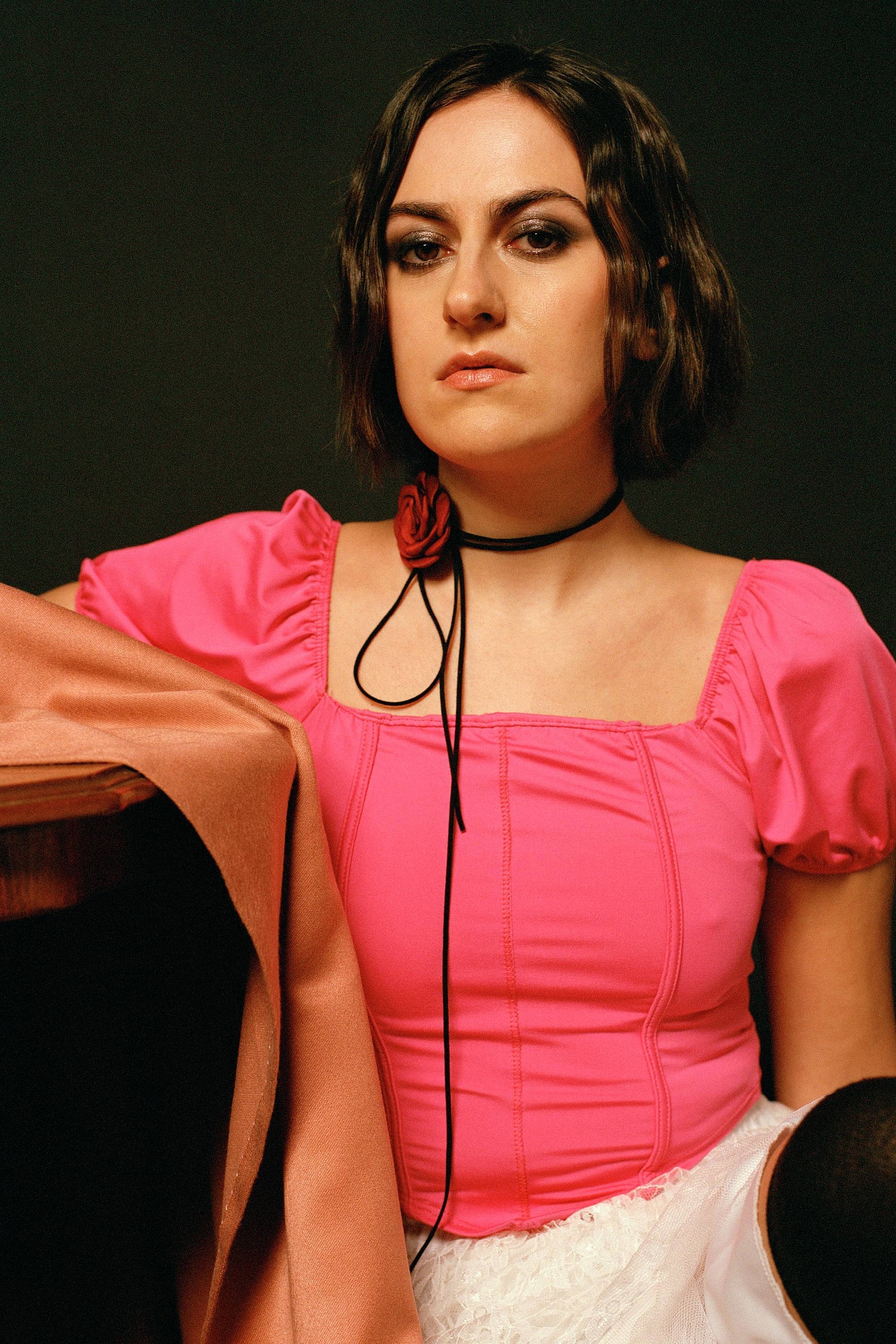
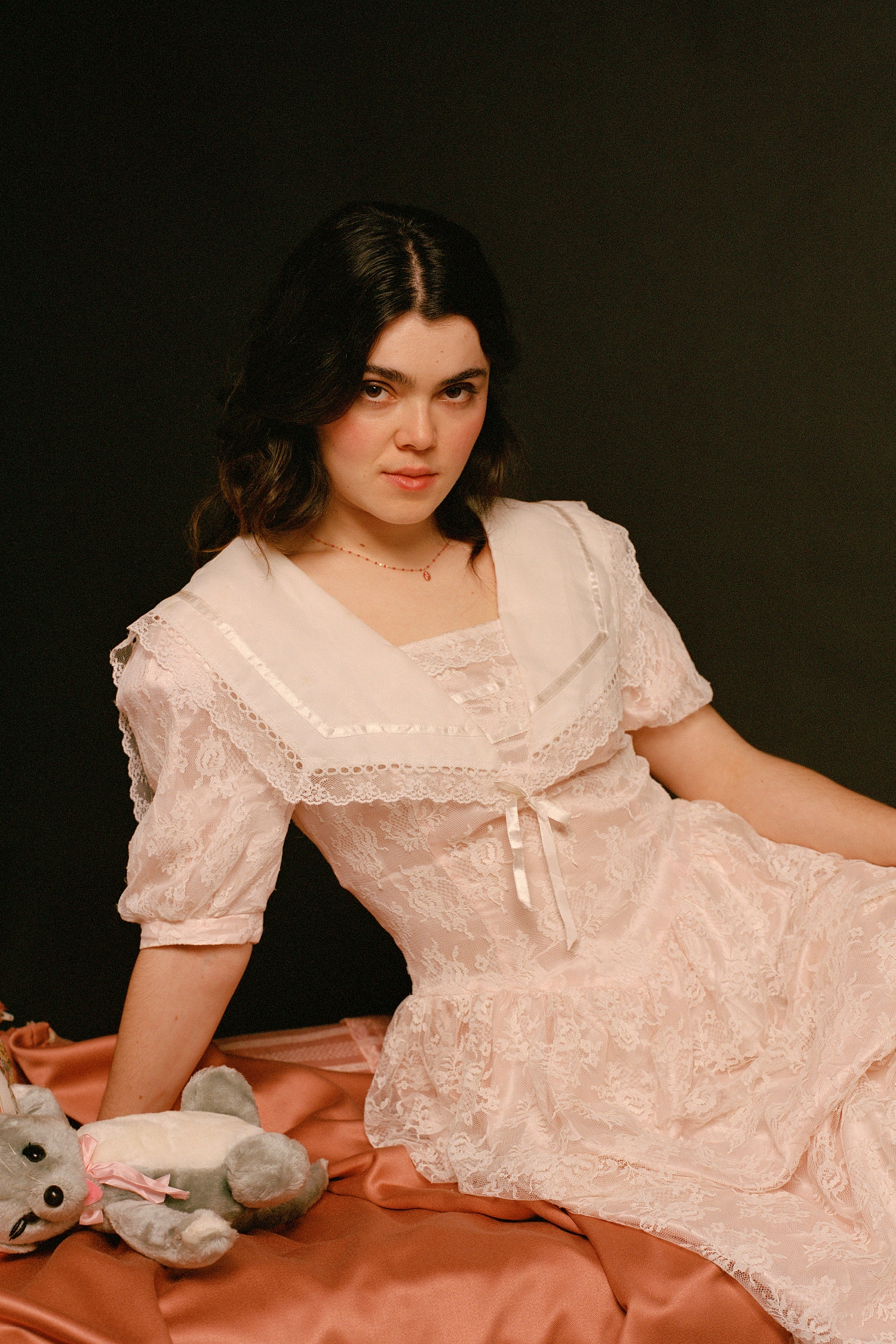
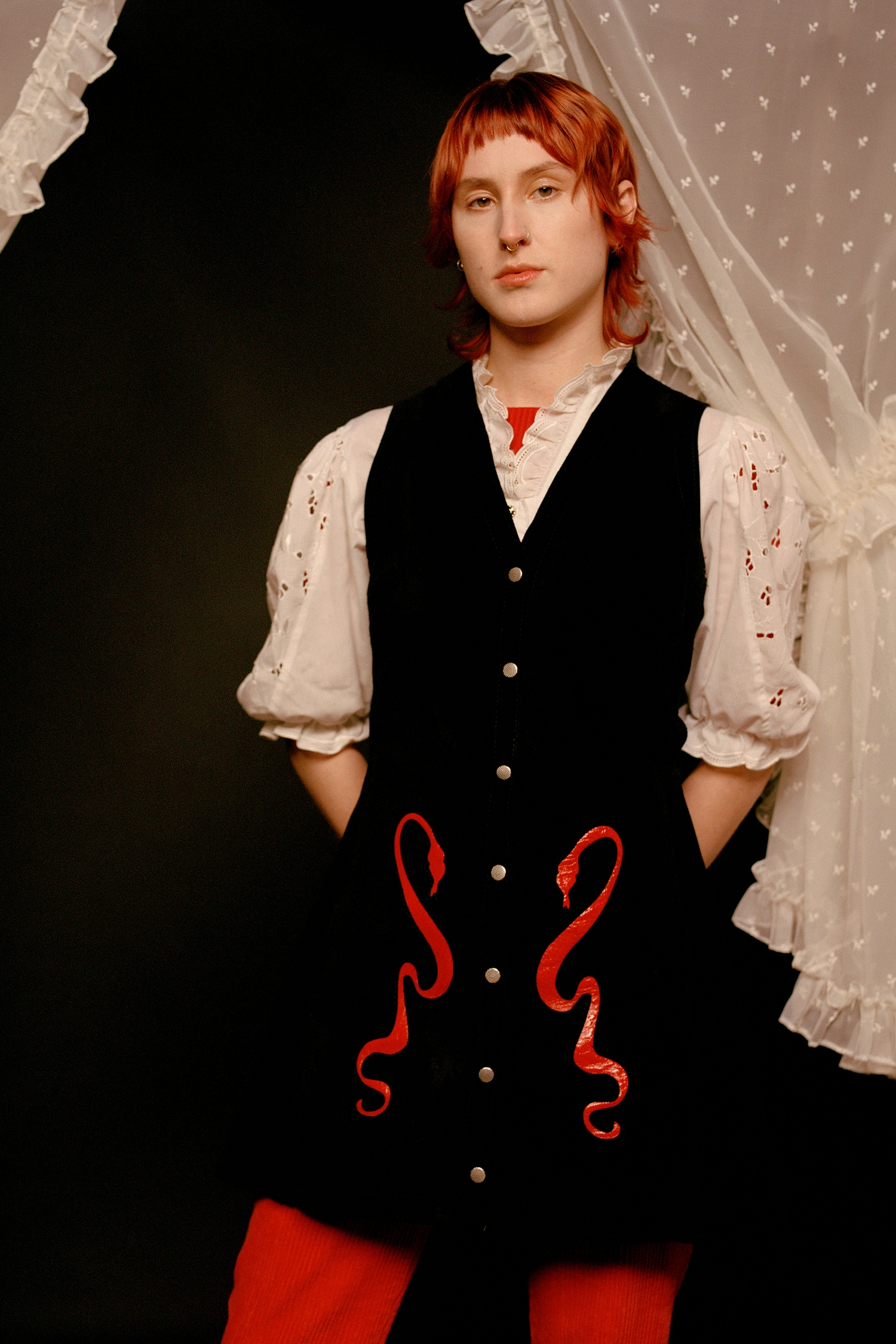
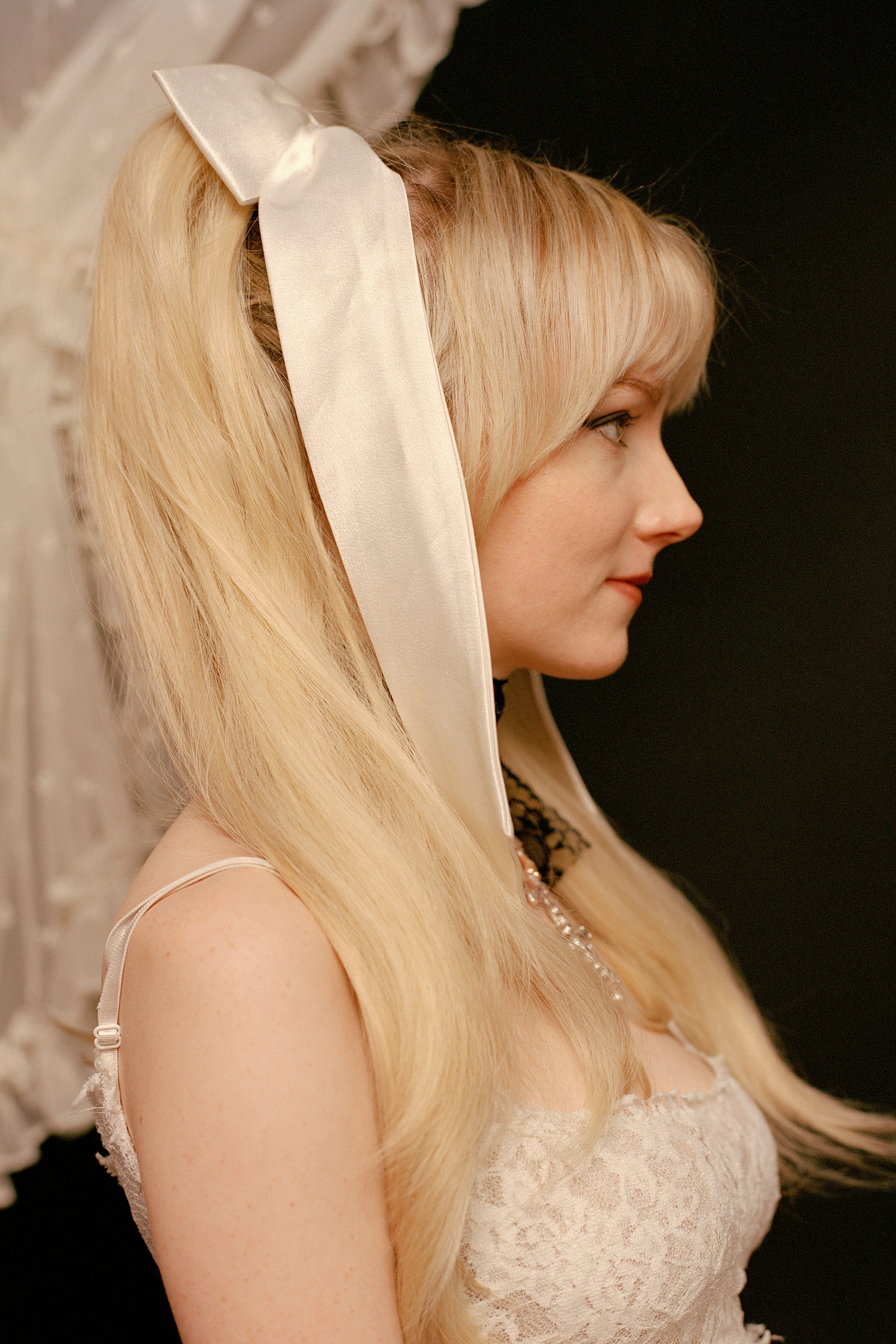
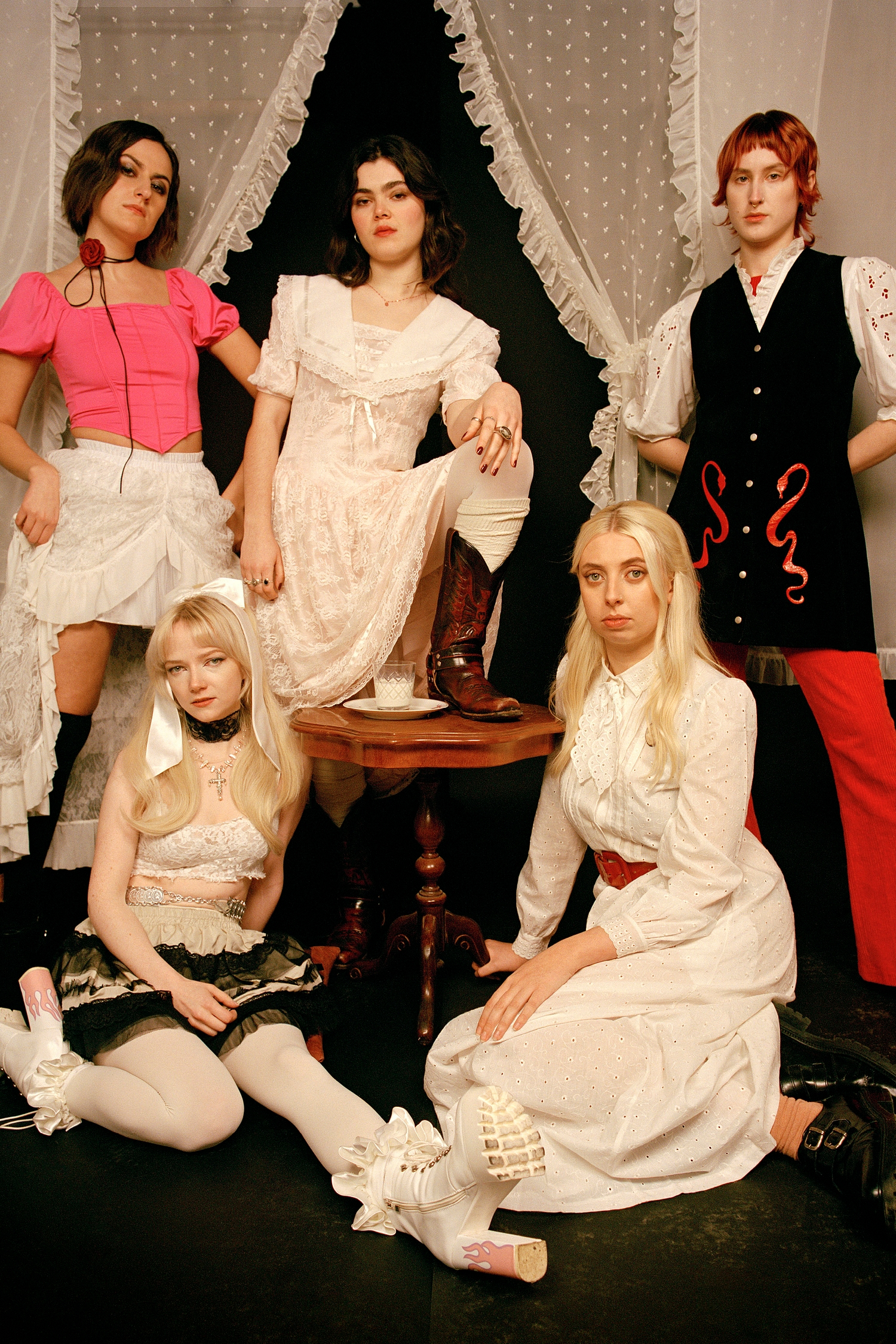
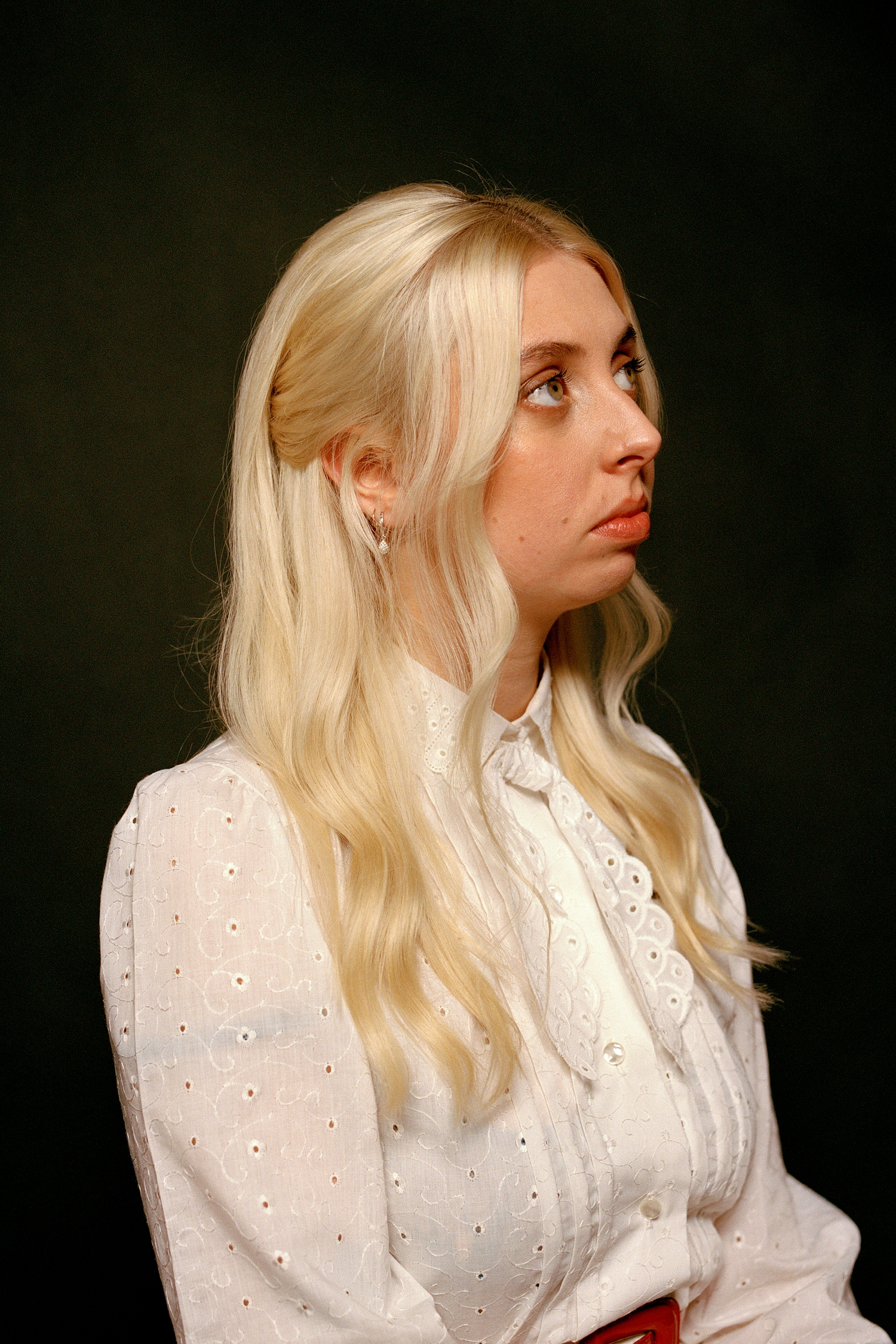
Having met in London during freshers week at university, Georgia, Lizzie and Abigail were friends for three years before deciding to form a band. After an early practice made it clear their line-up wasn’t quite complete, they found Guildhall students Aurora Nishevci (keys/vocals) and Emily Roberts (lead guitar, mandolin, flute) through mutual friends, and The Dinner Party - as was their original moniker - was born.
“We got right into brainstorming mode,” says Georgia. “Basically, we aimed to be the band that we wanted to see. When we were first at university, it was very much that Windmill era of guitar music - black midi, Black Country, New Road, Squid. Bands who are all fucking brilliant. That was when we realised guitar music can have this kind of feral hype around it, and can build an audience based on live shows alone; that was something we really, really loved. What we didn’t like so much was the seriousness of a lot of things. It’s ironic, [some bands] put so much effort into trying to look effortless. It doesn’t matter to us that it looks like we’re trying, because we really are.”
Indeed, YouTube footage of some of the band’s earliest gigs - courtesy of the capital’s legendary chronicler Lou Smith - proves that they never set out to do anything by halves; for The Last Dinner Party, maximal theatrical flair has always been the order of the day. They draw inspiration variously from Christian iconography, Romanticism, myth, folklore and more, all of which is overlaid with a playful sense of Victorian fin de siècle hedonism. “Ding ding ding!” nods Abigail, when DIY posits Oscar Wilde’s The Picture Of Dorian Gray as an anchoring reference. Georgia smiles, explaining that, “We literally wrote down ‘Lord Henry’s garden’ when we were first coming up with the whole thing. That’s us: the sensory overload, the decadence and aestheticism.”
A case in point? ‘Nothing Matters’ - their superlative debut single, which landed last April like a suckerpunch to the senses. Majestic, anthemic, and with a guitar solo that would make even the most chin-stroking 6 Music dad strum the air, the track swiftly ended TLDP’s time as a cult band whose reputation was composed largely of live recordings and awed smoking area exchanges. By this point, they’d already signed to Island, who by all accounts discovered them off the back of Smith’s videography. But to some corners of the internet, it was nigh on incomprehensible that the band could have major label backing - and an already fully realised creative vision - without nepotistic connections. The phrase ‘industry plant’ was predictably tossed around, alongside a fair amount more insidious comments, the gist of which Georgia summarises as: “This can’t be real because you’re women - you must have fucked someone to get to where you are.”
Over the past few years, there have been a few such instances that acted as flashpoints for important discussions around the nature of power structures in the music industry, and the types of privilege which afford artists access to them (namely whiteness, class, gender, and conventional attractiveness). “The nuanced comments about the music industry are so important,” says Lizzie, “but that’s not the conversation those misogynists are trying to have.” “Would [the internet trolls] expect us to be handed a record deal and reply, ‘No thanks, I’d rather struggle’?” Abigail asks. “Even if we had struggled for five years and then had a rise,” Lizzie rejoins, “people who hadn’t heard of us would still ask, ‘Where have they come from?’ If you weren’t [in London] when we were playing those gigs for over a year then no, obviously you wouldn’t have known who we were.”
In what felt like a gloriously defiant two fingers up to the boys who cried industry plant, TLDP’s recent UK tour was supported by Picture Parlour, who too received vitriolic responses to their 2023 debut release. And though the rooms have got bigger, and the tickets sell quicker, there’s no doubting that The Last Dinner Party are still architects of those ‘you had to be there’ moments of the early days.
The second night of their two-date stint at Hackney’s EartH, for example, had an atmosphere that was tangible in its reverence, while you could spot the gig’s attendees on the Overground to Dalston based on outfit alone (the band frequently set optional - but encouraged - dress codes for their shows). What do they think it is that inspires such fervour? “I am the second coming of Christ,” Abigail deadpans, before breaking into a smile. “I think it’s just fan culture; when you find something quite niche and specific that speaks to you, you want to replicate it in yourself.
“I also believe that the instinct in humans that searches for meaning and community through religion is the same part that looks for understanding in music,” she continues. “I think it’s that innate need for something bigger than oneself. Something communal like that is a social need for us - we’re fucking pack animals. It’s the same thing; the soul-searching and feeling of fulfilment that people find in music is the same as that [offered by] religion.”
Attending a gig - much like a football match - necessarily involves a relieving of individuality: for the duration of that event, you become one of many contributors to the collective experience, connecting you to your fellow crowd members on quite a primal, poignant level. “It’s really important to us to curate safe spaces for audiences to come and be the biggest version of themselves that they can and want to be,” nods Lizzie. “And that goes for people of all genders, obviously, but particularly for women and queer people. It’s been so impactful on me - and on all of us - to be able to curate spaces like that.”
In that sense, The Last Dinner Party’s timing has been especially apt. Post-pandemic, the public appetite for these sorts of joyful, communal events has been heightened dramatically, as people emerged from lockdown with what Lizzie calls “a post-war kind of mentality”. While the world at large had developed “more of a taste for theatricality, for just going for it”, the band themselves had spent the period honing their craft, emerging in earnest just as the post-punk boom reached peak saturation.
“I think art always subconsciously responds to things that are in the political and public zeitgeist,” muses Georgia. “The post-punk thing kind of emerged as a product of the Brexit austerity era, and people wanted to be viciously angry about that. And then post-Covid, people just wanted to have fun.” Abigail agrees, citing “the natural pendulum of taste” as a factor behind the band’s fairly immediate popularity, rather than any deliberate reactionism on their part. “We’re just drawn to dramatic maximalism, and we’ve luckily come at the right time when people want this. It’s just a good fucking alignment.”
In The Dressing Up Box
The Last Dinner Party have become renowned for their maximalist aesthetic and fantastical fashion, but what were the suggested audience dress codes on their recent UK tour?
O Muse! Greek Myths & Legends
Think drapey white sheets, gold-leaf crowns, and copious amounts of wine.
The Language of Flowers & Victoriana
Pinning a green carnation to your lapel, à la Oscar Wilde.
Velvet Goldmine
Sharp suits! Androgyny! Mullets!
Brothers Grimm: Folklore & Fairytales
Delightfully dark, not Disney - Angela Carter, eat your heart out.
“Dramatic maximalism” is one way to put it. Another is ecstasy: both the MO of TLDP’s live shows and the central tenet of their debut album. ‘Prelude To Ecstasy’ arrives on 2nd February, and is an exploration of extremes. Here, love is obsession (‘Burn Alive’); subversive desire is exorcistic possession (‘My Lady Of Mercy’); gender envy is profound (‘Beautiful Boy’), and breakups are torturous in their anguish (‘On Your Side’; ‘Portrait Of A Dead Girl’). It’s a collection of songs which take the inner workings of young women’s minds and, through metaphors of history and high culture, render them so grand as to be deserving of similar attention.
“If you listen to a love song that’s describing common emotions in a common tongue, it’s relatable because it’s so universal,” says Abigail. “But if you write a love song that talks about the pain of love in a way that’s very, very specific to what you’ve experienced - using a particular literary reference or whatever - then for the person who listens to it and relates to it, it’s even more meaningful.” “There’s a reason Greek tragedies are still performed and read today,” adds Lizzie. “They express emotion in a very beautiful, very extreme way - which is how it feels.” “That’s how it FEELS!” Abigail rejoins, laughing now. “It feels like my liver getting pecked out, or pushing a huge rock up a hill.”
At the core of ‘Prelude To Ecstasy’ are two themes: sex, and religion. More specifically, the record dissects the nature of what’s found in the middle of this Venn diagram - the perception of sexuality as sinful; the analogous nature of orgasmic pleasure and spiritual fervour; how ultimately, the concepts are two sides of the same coin. “I was raised Catholic very strictly,” affirms Abigail. “Now, I wouldn’t say that I’m a religious person in that sense, but I’m not an atheist. I really like to talk about sex through religion because, growing up, those two were so intertwined.
“Sex: bad. Homosexuality: bad. These are things to be ashamed of,” she continues, referencing her childhood’s Catholic school teachings. “But then in Catholicism there is also religious imagery that is very sexual, because Catholics are obsessed with sex. [The band] is kind of wanting to reappropriate religious imagery for our own gain, for [the purpose of] expressing sexuality and femininity and queerness.”
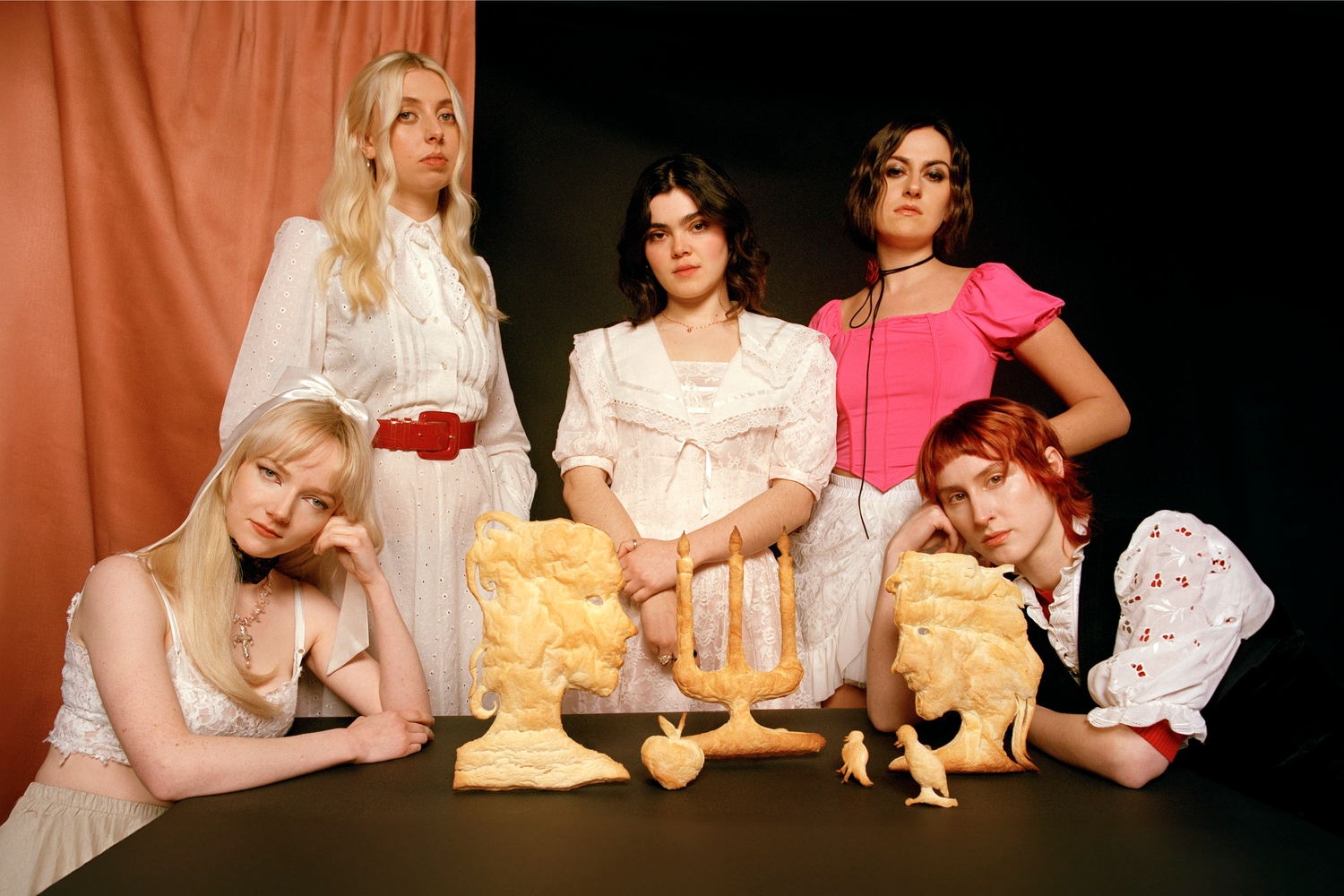
Musically, it’s just as extravagant and ornate as this suggests. From literally opening with a curtain-up orchestral overture (‘Prelude’), to switching up song structures, tempos, vocalists and even languages, the album is a supremely confident, stunningly rich affair on which The Last Dinner Party revel in the full extent of their showmanship. “It was just a pleasure outing, really,” Abigail says of the recording process, which took place with the help of producer James Ford - “the nicest man in music” - before ‘Nothing Matters’ was even released. “It all came from a place of insular joy, from just being like kids in a candy shop thinking, ‘What’s going to make us the most excited, happy, inspired, and challenged?’”
She continues: “I feel like the best artists and the ones with the most longevity are those where the fans can see that they’re just purely doing their own thing, like David Bowie, rather than falling into the trap of doing what you think people want. If you make something you think people are gonna like, they either like it and you feel empty, or they hate it and you feel stupid. We have no choice than to just do what we love, in that sense.”
It’s an approach that has held them in good stead so far. They’ve sold out London’s 3,300-capacity Roundhouse, performed on Later… with Jools Holland, won the BRITs 2024 Rising Star Award (the first guitar band ever to do so), and topped BBC Radio 1’s Sound Of 2024 poll. “I think we would all go completely mental if we weren’t doing this together,” says Lizzie on whether they feel prepared for the speed and scale of it all. “I’d hate to be a solo artist having this kind of meteoric rise; the only reason I’m sane is because the others are also going through the same thing, so I’m not just making it up in my head.”
And some of their recent experiences really have been the stuff of daydreams. Most significant, Georgia says, was meeting Florence Welch at the George Tavern - back where it all began - when Welch broke the news of their BBC Sound Of win. “I’ve idolised her since I was probably ten. I was a really troubled, misunderstood child, and I found such solace in her. So to have her be even more brilliant in person than who I’d built her up to be in my mind - which was, y’know, God. For her to say, ‘I’m so proud of you, you’re doing fantastic things’...” She pauses, slightly emotional. “When [Georgia’s boyfriend] proposes, you’ll be like, ‘Oh this is nice’,” Abigail grins at her bandmate, who replies: “This is the second best day of my life!” as everyone cracks up. “He can’t compete, he knows that.”
They may be being (only slightly) flippant, but the anecdote illustrates one of the key reasons why The Last Dinner Party have struck such a chord with so many: they’re fans. Of other artists, of literature, of art and fashion and history. They wear their influences on their ruffled sleeves and are utterly unafraid to enthuse, which in turn gives their audiences implicit encouragement to enjoy the show as much as the band clearly are.
And the best thing? All this is only the ‘Prelude To Ecstasy’. The pomp and circumstance, the bells and whistles, the sheer, unadulterated euphoria - it’s all just a hint of what’s to come, a mere taste to whet the appetite. So stay firmly seated and prepare to tuck in, because The Last Dinner Party’s next course is sure to be spectacular.
Literary Minds
What have the band got on their mood boards and bookshelves?
The Picture Of Dorian Gray, by Oscar Wilde
A tale of decadence, obsession, and the pursuit of new sensations. *Chef’s kiss*.
They Can’t Kill Us Until They Kill Us, by Hanif Abdurraqib
A “really beautifully written” collection of music essays which Lizzie says “is nicely digestible, but also so personal.”
War And Peace, by Leo Tolstoy
One of the greatest novels ever written… by a man who apparently thinks like a teenage girl. Sign us up!
Collected Poems of John Berryman
Abigail describes his sonnets as “some of the best modern poetry I’ve ever read”.
Julius Caesar, by William Shakespeare
So good that TLDP staged their own version.
‘Prelude to Ecstasy’ is out 2nd February via Island.
As featured in the February 2024 issue of DIY, out now.
Read More
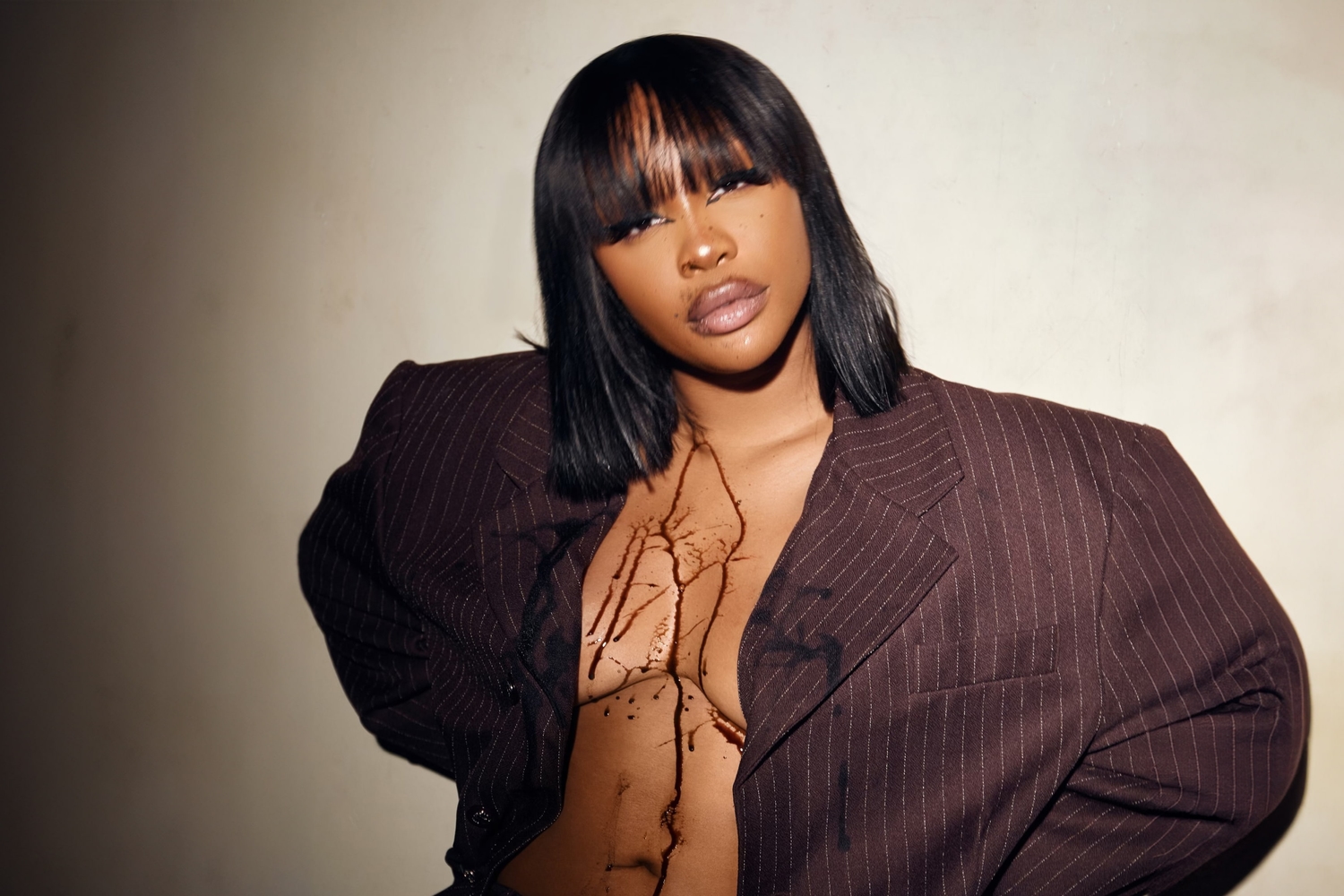
Roskilde Festival adds SZA, Jessie Ware, The Last Dinner Party and more to 2024 lineup
The Danish non-profit festival had previously confirmed the likes of Doja Cat, Foo Fighters, and PJ Harvey.
29th February 2024, 11:21am
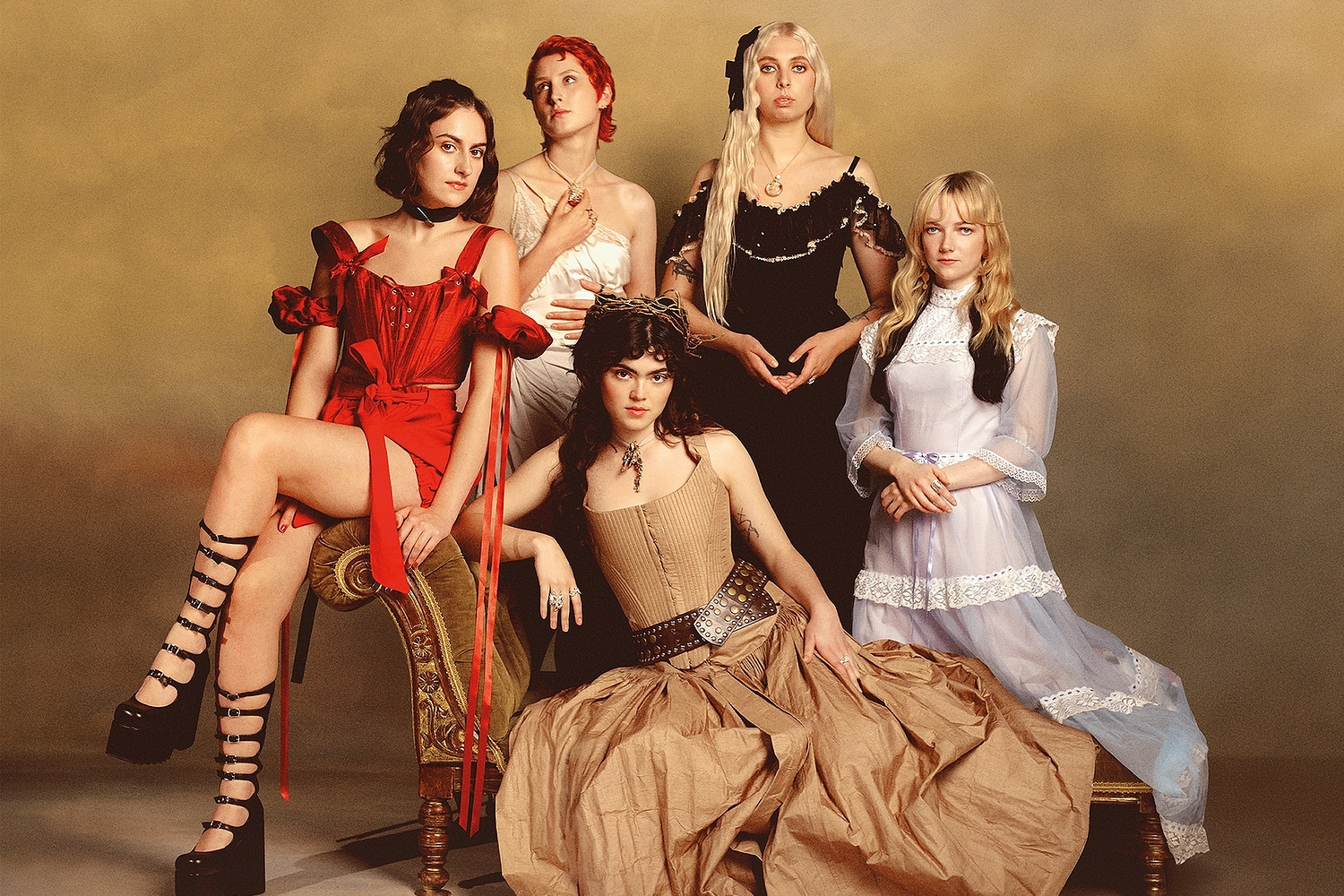
Tickets for The Last Dinner Party’s UK and Ireland tour on sale now
The band have also just added three new shows to their upcoming Autumn run.
9th February 2024, 8:00am
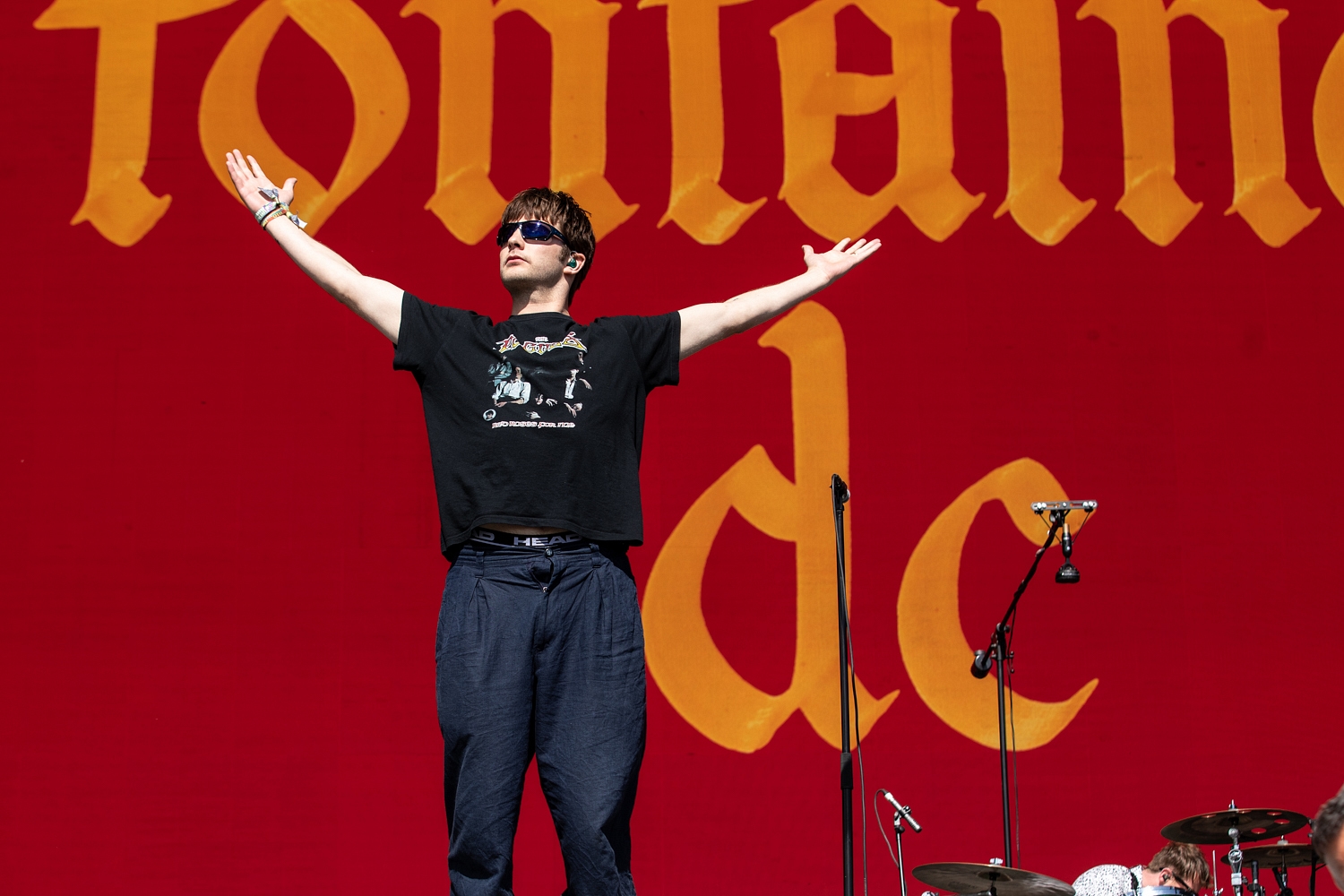
Reading & Leeds welcome Fontaines DC, beabadoobee, Bleachers and more to 2024 lineup
Over fifty names are set to join R&L's six headline acts this August bank hols.
1st February 2024, 6:35pm
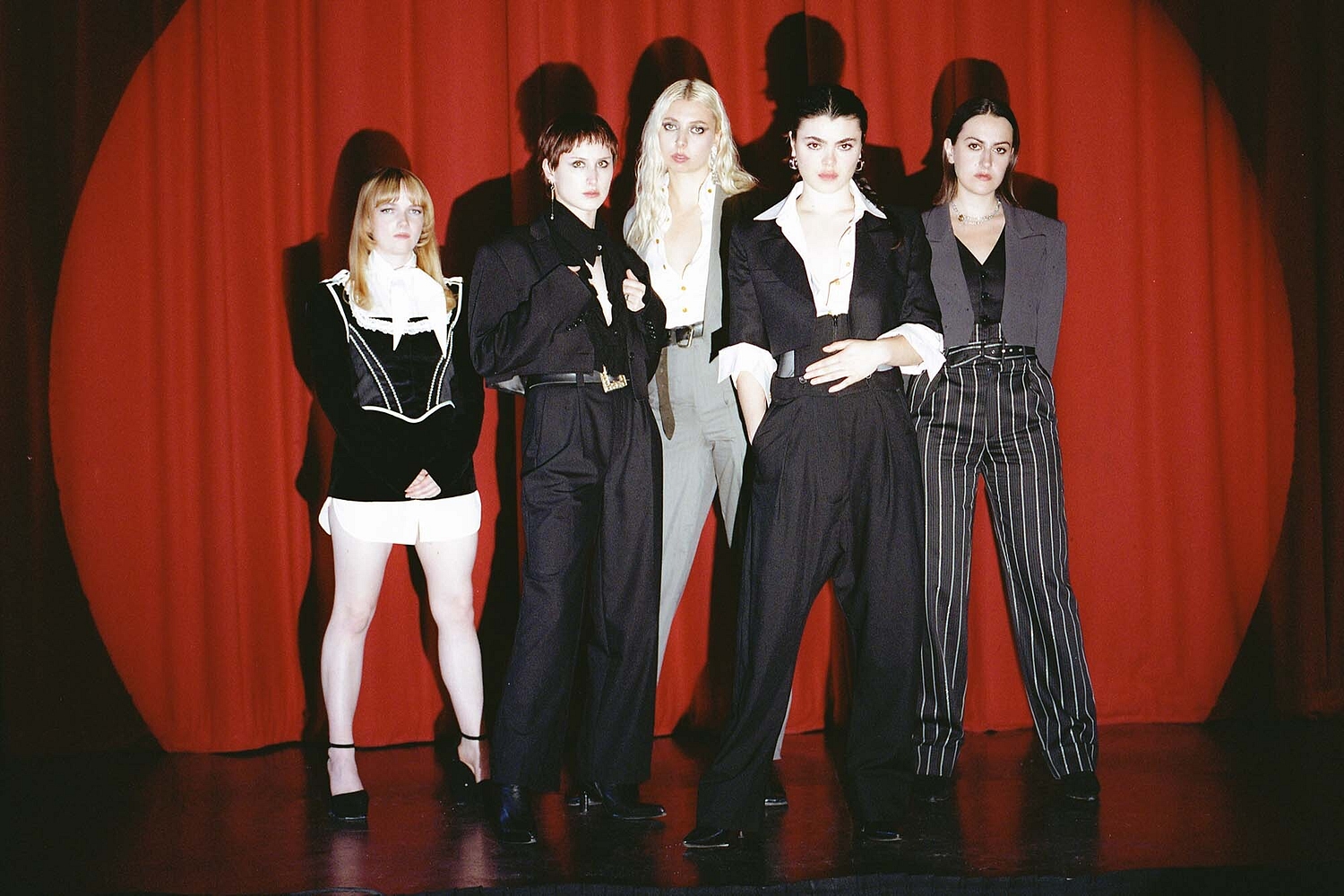
The Last Dinner Party - Prelude To Ecstasy
5 Stars
Sky-high, grandiose ambition that ties together lofty literary sentiment, cinematic sweeping theatricality and killer melodic indie hooks with an equal affinity for each.
31st January 2024, 8:00am
